BUS5PTB: IT Write Up - Hate-Speech and Free-Speech on Social Media
VerifiedAdded on 2022/10/15
|6
|1911
|19
Discussion Board Post
AI Summary
This IT Write Up explores the complex relationship between hate speech and free speech on social media platforms. The discussion begins by highlighting the increasing prevalence of hate speech and its negative impacts, including violence and discrimination. It then defines both hate speech and free speech, examining their characteristics and legal implications. The analysis covers the challenges of balancing freedom of expression with the need to control harmful content, considering the decentralized nature of the internet and the varying laws across countries. The discussion references Facebook, the First Amendment, and the role of social media platforms in facilitating both free speech and the spread of hate. The write-up emphasizes the importance of responsible social media usage, awareness of current laws, and the need for individuals and governments to address these issues. The conclusion reinforces the significance of free speech while advocating for restraint and responsibility in online communication, suggesting avenues for future research on the topic, including trials and prosecutions, and the limitations of hate-speech and free-speech laws. This assignment adheres to the BUS5PTB course requirements, reflecting research and critical thinking on the topic.
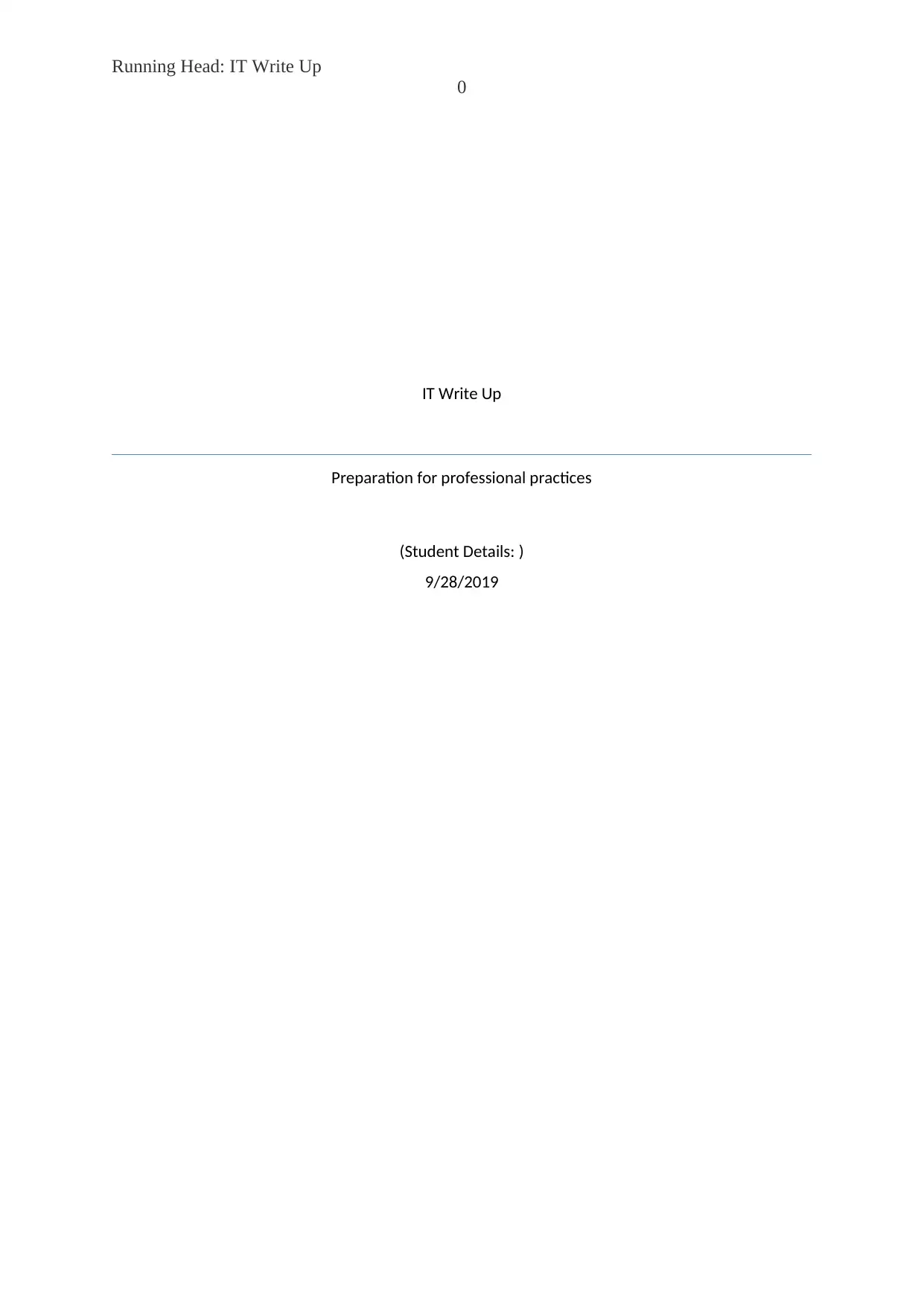
Running Head: IT Write Up
0
IT Write Up
Preparation for professional practices
(Student Details: )
9/28/2019
0
IT Write Up
Preparation for professional practices
(Student Details: )
9/28/2019
Paraphrase This Document
Need a fresh take? Get an instant paraphrase of this document with our AI Paraphraser
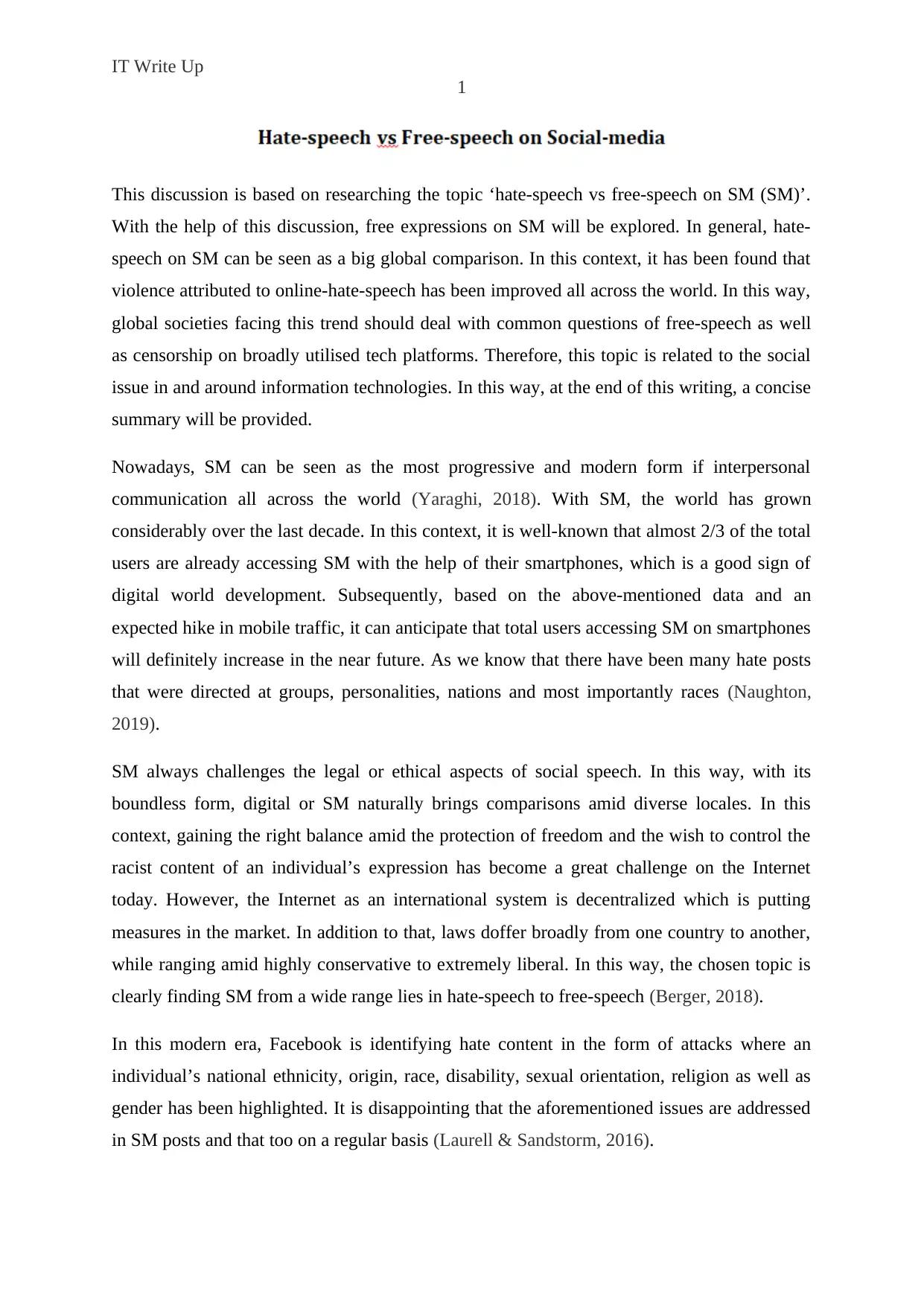
IT Write Up
1
This discussion is based on researching the topic ‘hate-speech vs free-speech on SM (SM)’.
With the help of this discussion, free expressions on SM will be explored. In general, hate-
speech on SM can be seen as a big global comparison. In this context, it has been found that
violence attributed to online-hate-speech has been improved all across the world. In this way,
global societies facing this trend should deal with common questions of free-speech as well
as censorship on broadly utilised tech platforms. Therefore, this topic is related to the social
issue in and around information technologies. In this way, at the end of this writing, a concise
summary will be provided.
Nowadays, SM can be seen as the most progressive and modern form if interpersonal
communication all across the world (Yaraghi, 2018). With SM, the world has grown
considerably over the last decade. In this context, it is well-known that almost 2/3 of the total
users are already accessing SM with the help of their smartphones, which is a good sign of
digital world development. Subsequently, based on the above-mentioned data and an
expected hike in mobile traffic, it can anticipate that total users accessing SM on smartphones
will definitely increase in the near future. As we know that there have been many hate posts
that were directed at groups, personalities, nations and most importantly races (Naughton,
2019).
SM always challenges the legal or ethical aspects of social speech. In this way, with its
boundless form, digital or SM naturally brings comparisons amid diverse locales. In this
context, gaining the right balance amid the protection of freedom and the wish to control the
racist content of an individual’s expression has become a great challenge on the Internet
today. However, the Internet as an international system is decentralized which is putting
measures in the market. In addition to that, laws doffer broadly from one country to another,
while ranging amid highly conservative to extremely liberal. In this way, the chosen topic is
clearly finding SM from a wide range lies in hate-speech to free-speech (Berger, 2018).
In this modern era, Facebook is identifying hate content in the form of attacks where an
individual’s national ethnicity, origin, race, disability, sexual orientation, religion as well as
gender has been highlighted. It is disappointing that the aforementioned issues are addressed
in SM posts and that too on a regular basis (Laurell & Sandstorm, 2016).
1
This discussion is based on researching the topic ‘hate-speech vs free-speech on SM (SM)’.
With the help of this discussion, free expressions on SM will be explored. In general, hate-
speech on SM can be seen as a big global comparison. In this context, it has been found that
violence attributed to online-hate-speech has been improved all across the world. In this way,
global societies facing this trend should deal with common questions of free-speech as well
as censorship on broadly utilised tech platforms. Therefore, this topic is related to the social
issue in and around information technologies. In this way, at the end of this writing, a concise
summary will be provided.
Nowadays, SM can be seen as the most progressive and modern form if interpersonal
communication all across the world (Yaraghi, 2018). With SM, the world has grown
considerably over the last decade. In this context, it is well-known that almost 2/3 of the total
users are already accessing SM with the help of their smartphones, which is a good sign of
digital world development. Subsequently, based on the above-mentioned data and an
expected hike in mobile traffic, it can anticipate that total users accessing SM on smartphones
will definitely increase in the near future. As we know that there have been many hate posts
that were directed at groups, personalities, nations and most importantly races (Naughton,
2019).
SM always challenges the legal or ethical aspects of social speech. In this way, with its
boundless form, digital or SM naturally brings comparisons amid diverse locales. In this
context, gaining the right balance amid the protection of freedom and the wish to control the
racist content of an individual’s expression has become a great challenge on the Internet
today. However, the Internet as an international system is decentralized which is putting
measures in the market. In addition to that, laws doffer broadly from one country to another,
while ranging amid highly conservative to extremely liberal. In this way, the chosen topic is
clearly finding SM from a wide range lies in hate-speech to free-speech (Berger, 2018).
In this modern era, Facebook is identifying hate content in the form of attacks where an
individual’s national ethnicity, origin, race, disability, sexual orientation, religion as well as
gender has been highlighted. It is disappointing that the aforementioned issues are addressed
in SM posts and that too on a regular basis (Laurell & Sandstorm, 2016).
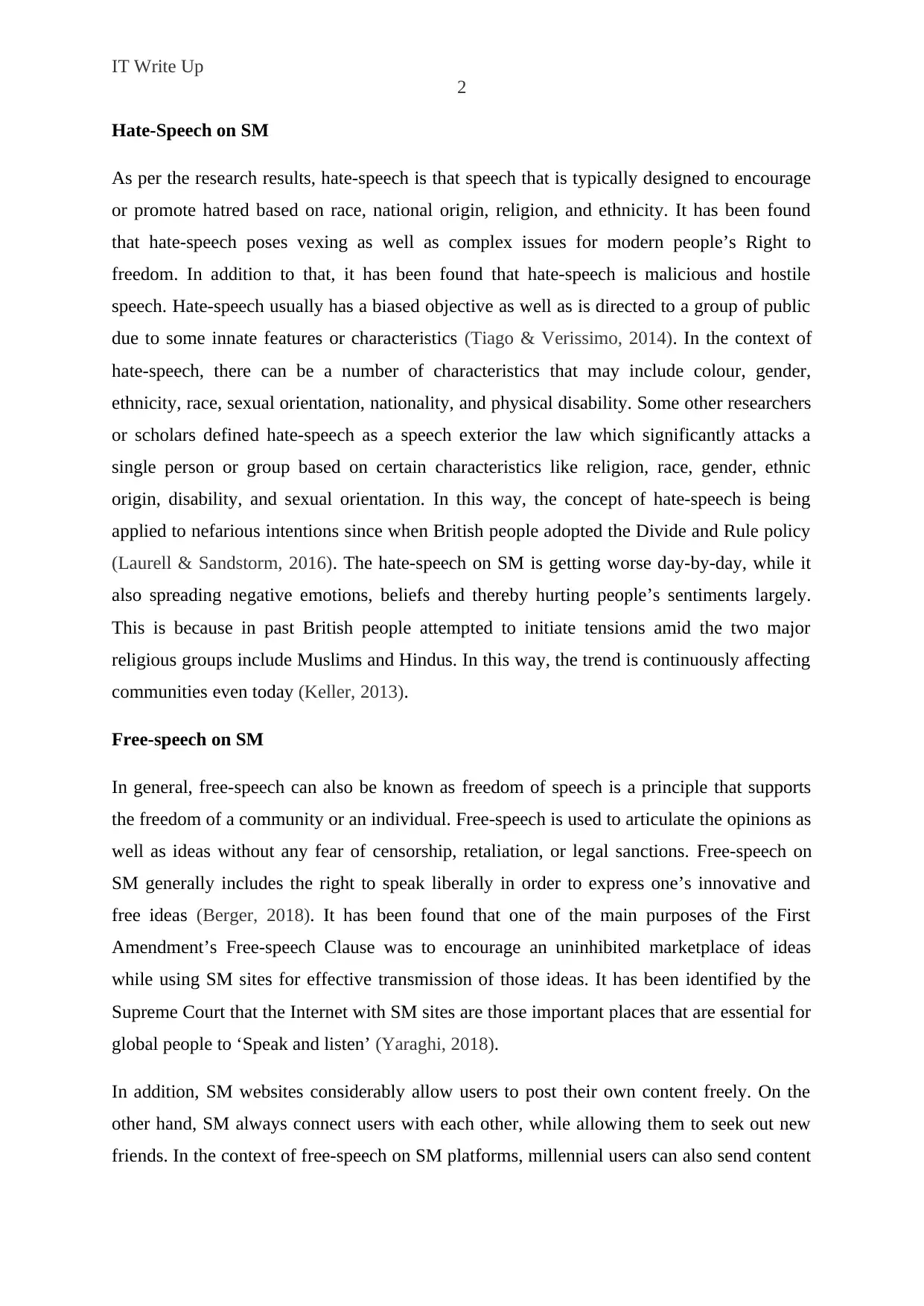
IT Write Up
2
Hate-Speech on SM
As per the research results, hate-speech is that speech that is typically designed to encourage
or promote hatred based on race, national origin, religion, and ethnicity. It has been found
that hate-speech poses vexing as well as complex issues for modern people’s Right to
freedom. In addition to that, it has been found that hate-speech is malicious and hostile
speech. Hate-speech usually has a biased objective as well as is directed to a group of public
due to some innate features or characteristics (Tiago & Verissimo, 2014). In the context of
hate-speech, there can be a number of characteristics that may include colour, gender,
ethnicity, race, sexual orientation, nationality, and physical disability. Some other researchers
or scholars defined hate-speech as a speech exterior the law which significantly attacks a
single person or group based on certain characteristics like religion, race, gender, ethnic
origin, disability, and sexual orientation. In this way, the concept of hate-speech is being
applied to nefarious intentions since when British people adopted the Divide and Rule policy
(Laurell & Sandstorm, 2016). The hate-speech on SM is getting worse day-by-day, while it
also spreading negative emotions, beliefs and thereby hurting people’s sentiments largely.
This is because in past British people attempted to initiate tensions amid the two major
religious groups include Muslims and Hindus. In this way, the trend is continuously affecting
communities even today (Keller, 2013).
Free-speech on SM
In general, free-speech can also be known as freedom of speech is a principle that supports
the freedom of a community or an individual. Free-speech is used to articulate the opinions as
well as ideas without any fear of censorship, retaliation, or legal sanctions. Free-speech on
SM generally includes the right to speak liberally in order to express one’s innovative and
free ideas (Berger, 2018). It has been found that one of the main purposes of the First
Amendment’s Free-speech Clause was to encourage an uninhibited marketplace of ideas
while using SM sites for effective transmission of those ideas. It has been identified by the
Supreme Court that the Internet with SM sites are those important places that are essential for
global people to ‘Speak and listen’ (Yaraghi, 2018).
In addition, SM websites considerably allow users to post their own content freely. On the
other hand, SM always connect users with each other, while allowing them to seek out new
friends. In the context of free-speech on SM platforms, millennial users can also send content
2
Hate-Speech on SM
As per the research results, hate-speech is that speech that is typically designed to encourage
or promote hatred based on race, national origin, religion, and ethnicity. It has been found
that hate-speech poses vexing as well as complex issues for modern people’s Right to
freedom. In addition to that, it has been found that hate-speech is malicious and hostile
speech. Hate-speech usually has a biased objective as well as is directed to a group of public
due to some innate features or characteristics (Tiago & Verissimo, 2014). In the context of
hate-speech, there can be a number of characteristics that may include colour, gender,
ethnicity, race, sexual orientation, nationality, and physical disability. Some other researchers
or scholars defined hate-speech as a speech exterior the law which significantly attacks a
single person or group based on certain characteristics like religion, race, gender, ethnic
origin, disability, and sexual orientation. In this way, the concept of hate-speech is being
applied to nefarious intentions since when British people adopted the Divide and Rule policy
(Laurell & Sandstorm, 2016). The hate-speech on SM is getting worse day-by-day, while it
also spreading negative emotions, beliefs and thereby hurting people’s sentiments largely.
This is because in past British people attempted to initiate tensions amid the two major
religious groups include Muslims and Hindus. In this way, the trend is continuously affecting
communities even today (Keller, 2013).
Free-speech on SM
In general, free-speech can also be known as freedom of speech is a principle that supports
the freedom of a community or an individual. Free-speech is used to articulate the opinions as
well as ideas without any fear of censorship, retaliation, or legal sanctions. Free-speech on
SM generally includes the right to speak liberally in order to express one’s innovative and
free ideas (Berger, 2018). It has been found that one of the main purposes of the First
Amendment’s Free-speech Clause was to encourage an uninhibited marketplace of ideas
while using SM sites for effective transmission of those ideas. It has been identified by the
Supreme Court that the Internet with SM sites are those important places that are essential for
global people to ‘Speak and listen’ (Yaraghi, 2018).
In addition, SM websites considerably allow users to post their own content freely. On the
other hand, SM always connect users with each other, while allowing them to seek out new
friends. In the context of free-speech on SM platforms, millennial users can also send content
⊘ This is a preview!⊘
Do you want full access?
Subscribe today to unlock all pages.

Trusted by 1+ million students worldwide
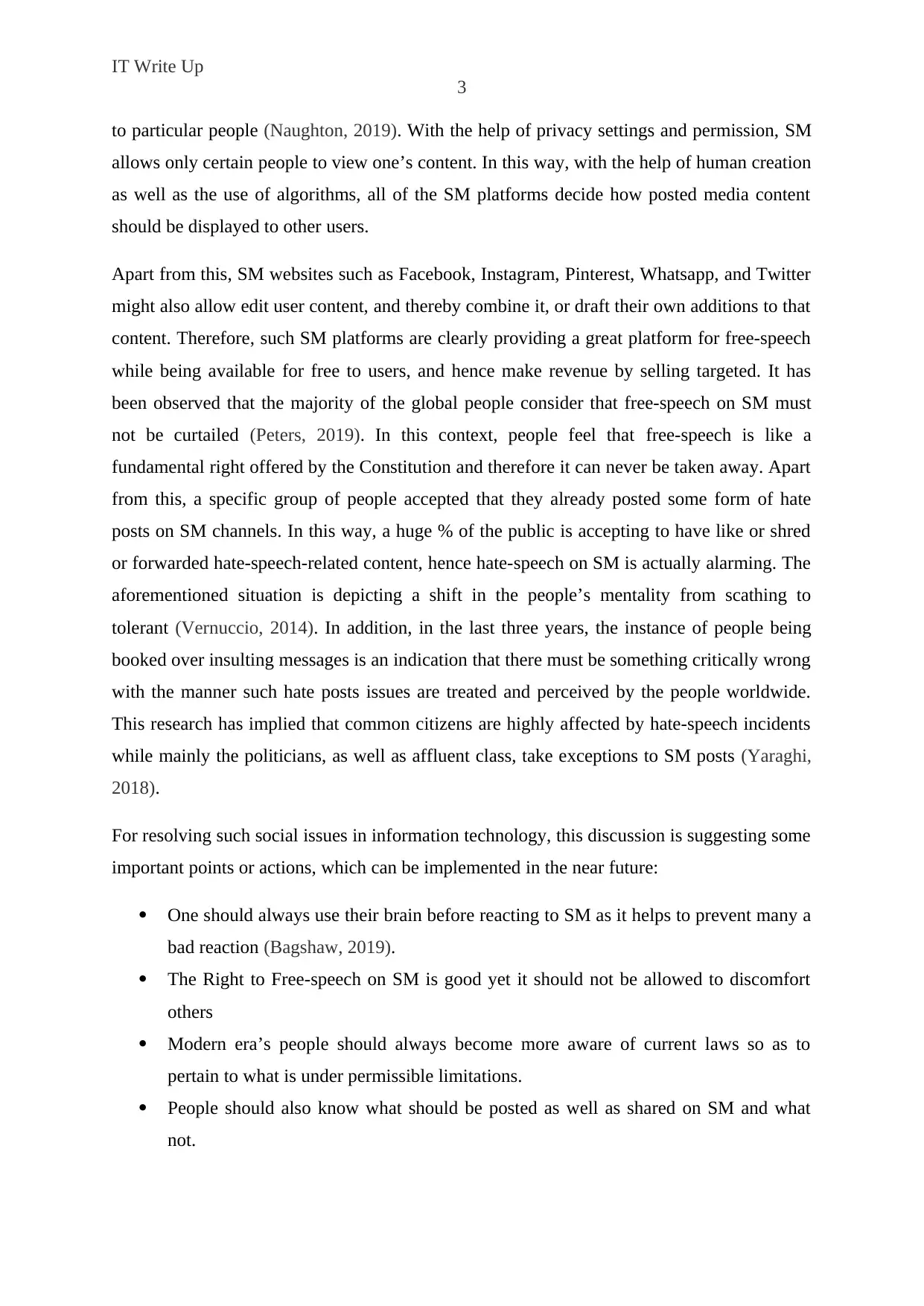
IT Write Up
3
to particular people (Naughton, 2019). With the help of privacy settings and permission, SM
allows only certain people to view one’s content. In this way, with the help of human creation
as well as the use of algorithms, all of the SM platforms decide how posted media content
should be displayed to other users.
Apart from this, SM websites such as Facebook, Instagram, Pinterest, Whatsapp, and Twitter
might also allow edit user content, and thereby combine it, or draft their own additions to that
content. Therefore, such SM platforms are clearly providing a great platform for free-speech
while being available for free to users, and hence make revenue by selling targeted. It has
been observed that the majority of the global people consider that free-speech on SM must
not be curtailed (Peters, 2019). In this context, people feel that free-speech is like a
fundamental right offered by the Constitution and therefore it can never be taken away. Apart
from this, a specific group of people accepted that they already posted some form of hate
posts on SM channels. In this way, a huge % of the public is accepting to have like or shred
or forwarded hate-speech-related content, hence hate-speech on SM is actually alarming. The
aforementioned situation is depicting a shift in the people’s mentality from scathing to
tolerant (Vernuccio, 2014). In addition, in the last three years, the instance of people being
booked over insulting messages is an indication that there must be something critically wrong
with the manner such hate posts issues are treated and perceived by the people worldwide.
This research has implied that common citizens are highly affected by hate-speech incidents
while mainly the politicians, as well as affluent class, take exceptions to SM posts (Yaraghi,
2018).
For resolving such social issues in information technology, this discussion is suggesting some
important points or actions, which can be implemented in the near future:
One should always use their brain before reacting to SM as it helps to prevent many a
bad reaction (Bagshaw, 2019).
The Right to Free-speech on SM is good yet it should not be allowed to discomfort
others
Modern era’s people should always become more aware of current laws so as to
pertain to what is under permissible limitations.
People should also know what should be posted as well as shared on SM and what
not.
3
to particular people (Naughton, 2019). With the help of privacy settings and permission, SM
allows only certain people to view one’s content. In this way, with the help of human creation
as well as the use of algorithms, all of the SM platforms decide how posted media content
should be displayed to other users.
Apart from this, SM websites such as Facebook, Instagram, Pinterest, Whatsapp, and Twitter
might also allow edit user content, and thereby combine it, or draft their own additions to that
content. Therefore, such SM platforms are clearly providing a great platform for free-speech
while being available for free to users, and hence make revenue by selling targeted. It has
been observed that the majority of the global people consider that free-speech on SM must
not be curtailed (Peters, 2019). In this context, people feel that free-speech is like a
fundamental right offered by the Constitution and therefore it can never be taken away. Apart
from this, a specific group of people accepted that they already posted some form of hate
posts on SM channels. In this way, a huge % of the public is accepting to have like or shred
or forwarded hate-speech-related content, hence hate-speech on SM is actually alarming. The
aforementioned situation is depicting a shift in the people’s mentality from scathing to
tolerant (Vernuccio, 2014). In addition, in the last three years, the instance of people being
booked over insulting messages is an indication that there must be something critically wrong
with the manner such hate posts issues are treated and perceived by the people worldwide.
This research has implied that common citizens are highly affected by hate-speech incidents
while mainly the politicians, as well as affluent class, take exceptions to SM posts (Yaraghi,
2018).
For resolving such social issues in information technology, this discussion is suggesting some
important points or actions, which can be implemented in the near future:
One should always use their brain before reacting to SM as it helps to prevent many a
bad reaction (Bagshaw, 2019).
The Right to Free-speech on SM is good yet it should not be allowed to discomfort
others
Modern era’s people should always become more aware of current laws so as to
pertain to what is under permissible limitations.
People should also know what should be posted as well as shared on SM and what
not.
Paraphrase This Document
Need a fresh take? Get an instant paraphrase of this document with our AI Paraphraser
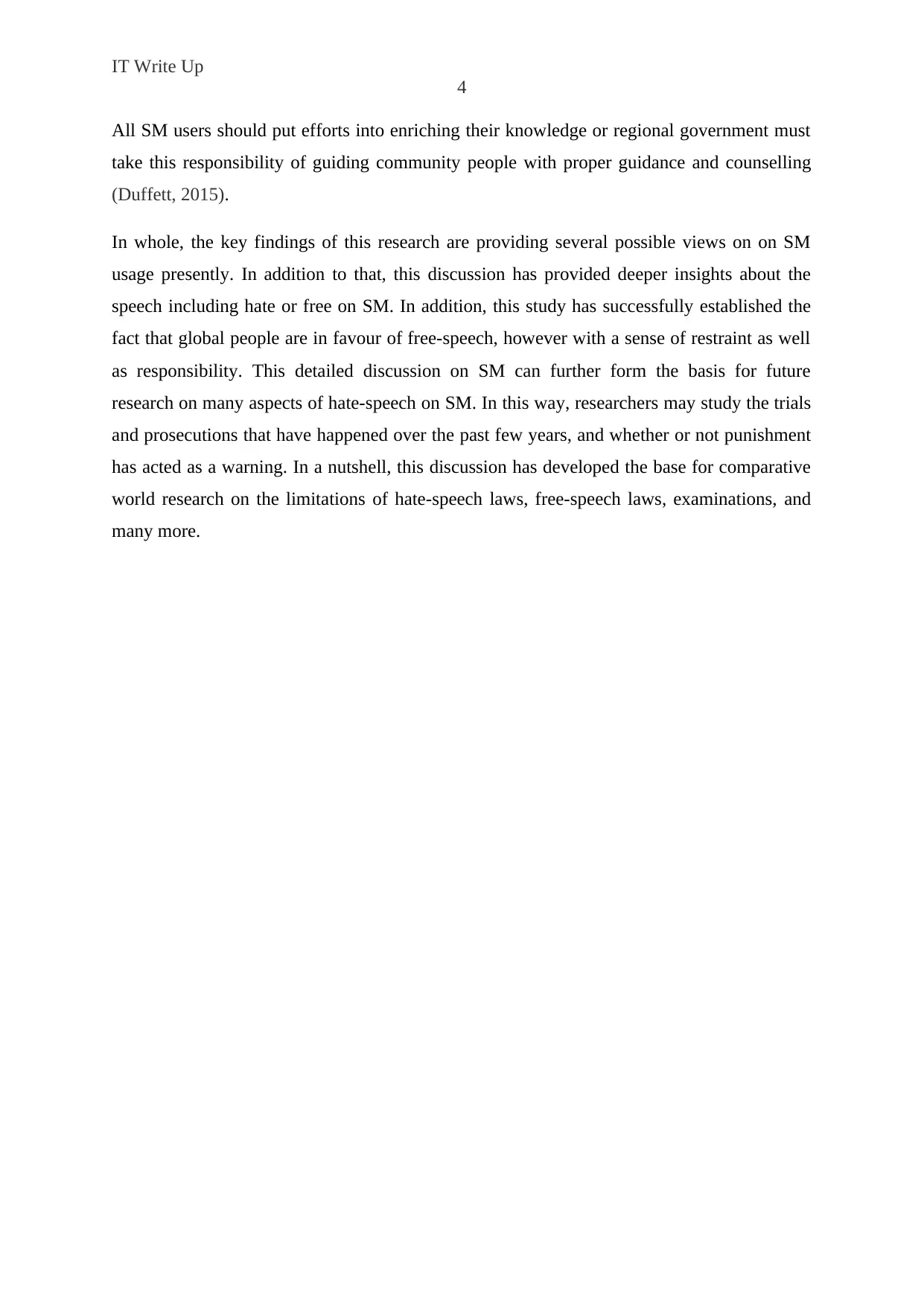
IT Write Up
4
All SM users should put efforts into enriching their knowledge or regional government must
take this responsibility of guiding community people with proper guidance and counselling
(Duffett, 2015).
In whole, the key findings of this research are providing several possible views on on SM
usage presently. In addition to that, this discussion has provided deeper insights about the
speech including hate or free on SM. In addition, this study has successfully established the
fact that global people are in favour of free-speech, however with a sense of restraint as well
as responsibility. This detailed discussion on SM can further form the basis for future
research on many aspects of hate-speech on SM. In this way, researchers may study the trials
and prosecutions that have happened over the past few years, and whether or not punishment
has acted as a warning. In a nutshell, this discussion has developed the base for comparative
world research on the limitations of hate-speech laws, free-speech laws, examinations, and
many more.
4
All SM users should put efforts into enriching their knowledge or regional government must
take this responsibility of guiding community people with proper guidance and counselling
(Duffett, 2015).
In whole, the key findings of this research are providing several possible views on on SM
usage presently. In addition to that, this discussion has provided deeper insights about the
speech including hate or free on SM. In addition, this study has successfully established the
fact that global people are in favour of free-speech, however with a sense of restraint as well
as responsibility. This detailed discussion on SM can further form the basis for future
research on many aspects of hate-speech on SM. In this way, researchers may study the trials
and prosecutions that have happened over the past few years, and whether or not punishment
has acted as a warning. In a nutshell, this discussion has developed the base for comparative
world research on the limitations of hate-speech laws, free-speech laws, examinations, and
many more.
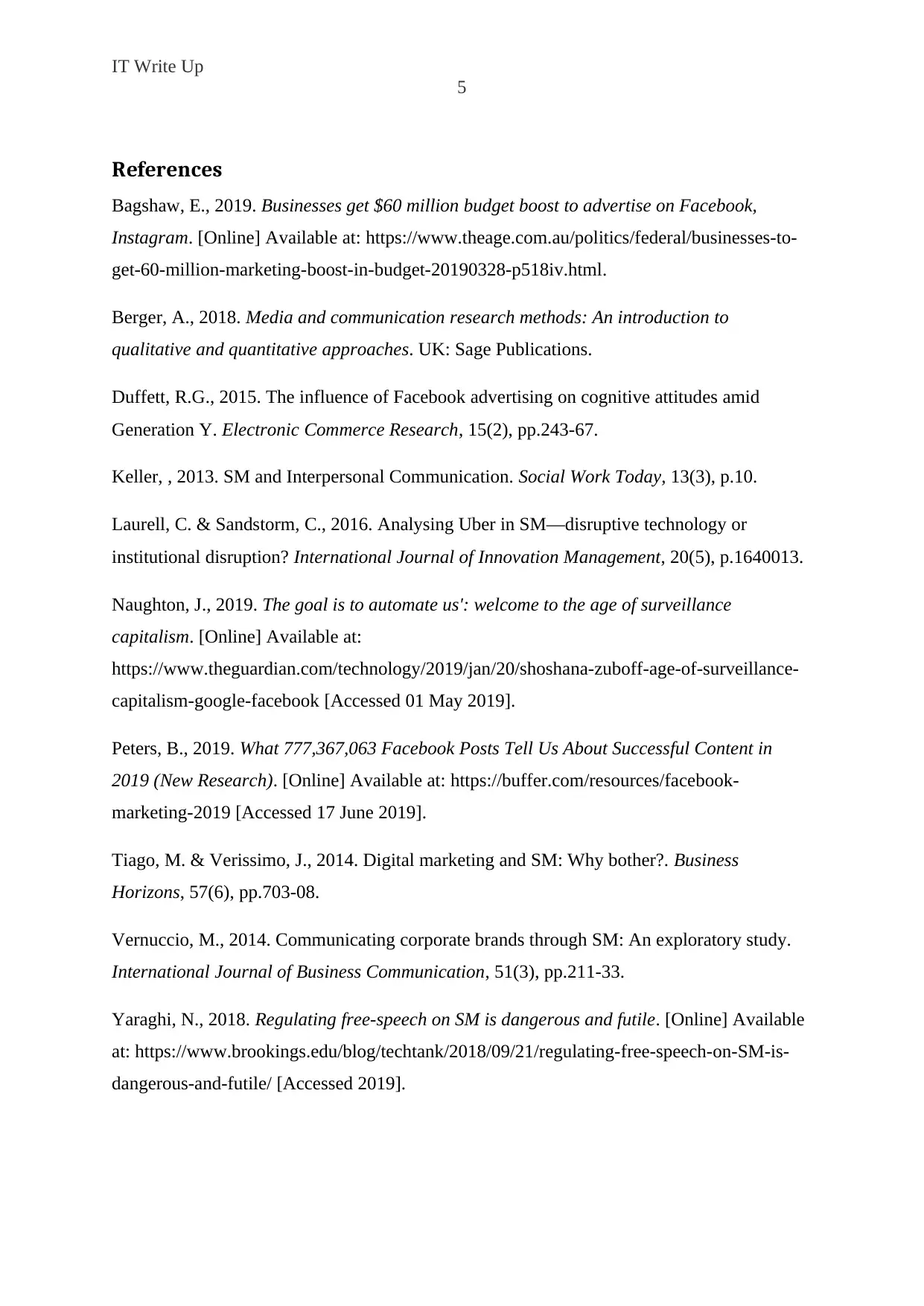
IT Write Up
5
References
Bagshaw, E., 2019. Businesses get $60 million budget boost to advertise on Facebook,
Instagram. [Online] Available at: https://www.theage.com.au/politics/federal/businesses-to-
get-60-million-marketing-boost-in-budget-20190328-p518iv.html.
Berger, A., 2018. Media and communication research methods: An introduction to
qualitative and quantitative approaches. UK: Sage Publications.
Duffett, R.G., 2015. The influence of Facebook advertising on cognitive attitudes amid
Generation Y. Electronic Commerce Research, 15(2), pp.243-67.
Keller, , 2013. SM and Interpersonal Communication. Social Work Today, 13(3), p.10.
Laurell, C. & Sandstorm, C., 2016. Analysing Uber in SM—disruptive technology or
institutional disruption? International Journal of Innovation Management, 20(5), p.1640013.
Naughton, J., 2019. The goal is to automate us': welcome to the age of surveillance
capitalism. [Online] Available at:
https://www.theguardian.com/technology/2019/jan/20/shoshana-zuboff-age-of-surveillance-
capitalism-google-facebook [Accessed 01 May 2019].
Peters, B., 2019. What 777,367,063 Facebook Posts Tell Us About Successful Content in
2019 (New Research). [Online] Available at: https://buffer.com/resources/facebook-
marketing-2019 [Accessed 17 June 2019].
Tiago, M. & Verissimo, J., 2014. Digital marketing and SM: Why bother?. Business
Horizons, 57(6), pp.703-08.
Vernuccio, M., 2014. Communicating corporate brands through SM: An exploratory study.
International Journal of Business Communication, 51(3), pp.211-33.
Yaraghi, N., 2018. Regulating free-speech on SM is dangerous and futile. [Online] Available
at: https://www.brookings.edu/blog/techtank/2018/09/21/regulating-free-speech-on-SM-is-
dangerous-and-futile/ [Accessed 2019].
5
References
Bagshaw, E., 2019. Businesses get $60 million budget boost to advertise on Facebook,
Instagram. [Online] Available at: https://www.theage.com.au/politics/federal/businesses-to-
get-60-million-marketing-boost-in-budget-20190328-p518iv.html.
Berger, A., 2018. Media and communication research methods: An introduction to
qualitative and quantitative approaches. UK: Sage Publications.
Duffett, R.G., 2015. The influence of Facebook advertising on cognitive attitudes amid
Generation Y. Electronic Commerce Research, 15(2), pp.243-67.
Keller, , 2013. SM and Interpersonal Communication. Social Work Today, 13(3), p.10.
Laurell, C. & Sandstorm, C., 2016. Analysing Uber in SM—disruptive technology or
institutional disruption? International Journal of Innovation Management, 20(5), p.1640013.
Naughton, J., 2019. The goal is to automate us': welcome to the age of surveillance
capitalism. [Online] Available at:
https://www.theguardian.com/technology/2019/jan/20/shoshana-zuboff-age-of-surveillance-
capitalism-google-facebook [Accessed 01 May 2019].
Peters, B., 2019. What 777,367,063 Facebook Posts Tell Us About Successful Content in
2019 (New Research). [Online] Available at: https://buffer.com/resources/facebook-
marketing-2019 [Accessed 17 June 2019].
Tiago, M. & Verissimo, J., 2014. Digital marketing and SM: Why bother?. Business
Horizons, 57(6), pp.703-08.
Vernuccio, M., 2014. Communicating corporate brands through SM: An exploratory study.
International Journal of Business Communication, 51(3), pp.211-33.
Yaraghi, N., 2018. Regulating free-speech on SM is dangerous and futile. [Online] Available
at: https://www.brookings.edu/blog/techtank/2018/09/21/regulating-free-speech-on-SM-is-
dangerous-and-futile/ [Accessed 2019].
⊘ This is a preview!⊘
Do you want full access?
Subscribe today to unlock all pages.

Trusted by 1+ million students worldwide
1 out of 6
Related Documents
Your All-in-One AI-Powered Toolkit for Academic Success.
+13062052269
info@desklib.com
Available 24*7 on WhatsApp / Email
![[object Object]](/_next/static/media/star-bottom.7253800d.svg)
Unlock your academic potential
Copyright © 2020–2026 A2Z Services. All Rights Reserved. Developed and managed by ZUCOL.





